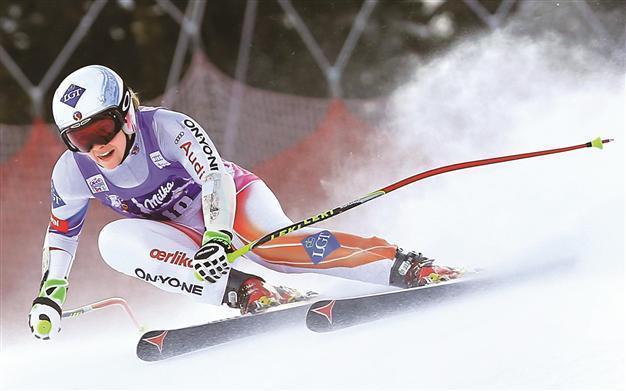German engineering key for Winter Games success
BERLIN / Reuters

Germany’s Maria Höfl-Riesch competes during a Super G event in Italy. Höfl-Riesch is one of Germany’s main medal hopes going into next month’s Winter Olympic Games in Sochi. AFP photo
Anyone who wants to understand why Germany has won more winter Olympic medals than any other country should pay a visit to a secretive state-sponsored engineering institute near the banks of the River Spree in a forgotten corner of east Berlin.
The high-tech tinkering by engineers at the FES Institute has helped Germany win many of its 128 Winter Olympic gold medals with state-of-the-art equipment and hopes are running high for another big haul in Sochi next month. The “Institut for Forschung und Entwicklung von Sportgeraeten” - the Institute for Research and Development of Sport Equipment - has a simple goal: to ensure that no German Olympic athlete is ever beaten because of inferior equipment.
The 35 engineers on the 70-person staff have been rising to the quadrennial challenge of designing and building what they believe are the world’s best bobsleds, luges, skeletons, speed skates, snowboards and ski jumping equipment.
“Technology plays a big role in some sports,” FES director Harald Schaale said in an interview. He said FES’s state-of-the art equipment can give world-class athletes a competitive edge but will never turn average performers into medalists.
“It’s our goal to be among the very best in the world in the sports we’re involved in,” he added on Tuesday on the first tour of the facilities ever given to foreign journalists. “Our engineers are working hard to improve the effectiveness of human performance with technology breakthroughs.”
Pursuit of winning Olympic medals Inside the institute, which was created by socialist East Germany in 1963, workers were studying computer simulations to improve bobsled blades in one lab while in another lab workers polished a kayak and an engineer tossed a cloth over the high-tech braking system of a bobsled when the journalists arrived.
Schaale’s enthusiasm waxes as he rambles on about applying German engineering to the pursuit of winning Olympic medals. The whole idea of “Vorsprung durch Technik” (advantage through technology) strikes to the very core what makes Germans tick.
“Yes, it’s all very German,” says Schaale, who is an engineer and former competitive sailor. “Engineers everywhere look at how science can improve how things work. It’s possible Germans are a bit more obsessed about it than others.”
No glory for engineers Germany has been at the top or in second place of the medals tables of the Winter Olympics in five of the last six editions while its performance the Summer Games has dropped steadily in the quarter century since Germany reunited.
Germany came in sixth place in the unofficial medals table with 11 gold medals at the 2012 Olympics in London, down from third place and 33 gold medals at Barcelona. But Germany topped the table at Albertville in 1992, Nagano in 1998 and Turin in 2006. They got second in 1988, 2002 and 2010 and third in 1994.
Overall, Germany leads the all-time Winter Olympics medals table with 128 gold and 358 total, ahead of Russia and Norway. The German Olympic sports confederation set a goal of 30 medals at Sochi, equal to Vancouver. Schaale believes athletes with FES equipment could win 15 medals.
Equipment can be the crucial deciding factor in many winter sports where Germany is a traditional powerhouse such as bobsled, luge, biathlon and cross-country skiing.
“We’re looking to gain advantages in the area of tenths of a second with the developments in technology,” he said.
Schaale and his engineers are quietly proud of their contribution to the success of winter sport athletes, although they also work for a few summer sports such as cycling, sailing, rowing and canoeing. The FES gets 90 percent of its funding, or 4.5 million euros, from the federal sport ministry.
Some athletes pay tribute to the FES for helping them - such as four-time bobsled gold medal winner Andre Lang who has invited FES staffers to barbecues. Yet Schaale says athletes are understandably reluctant to give engineers credit.
“We don’t need to be in the limelight,” Schaale said. “We’re a technology service provider. On top of that, we understand that athletes have to sell themselves more and more.
“Medal winners need to thank their sponsors and backers. Only if they’re in a really good mood will they thank engineers too. But it’s not a problem. They appreciate what we do.”
